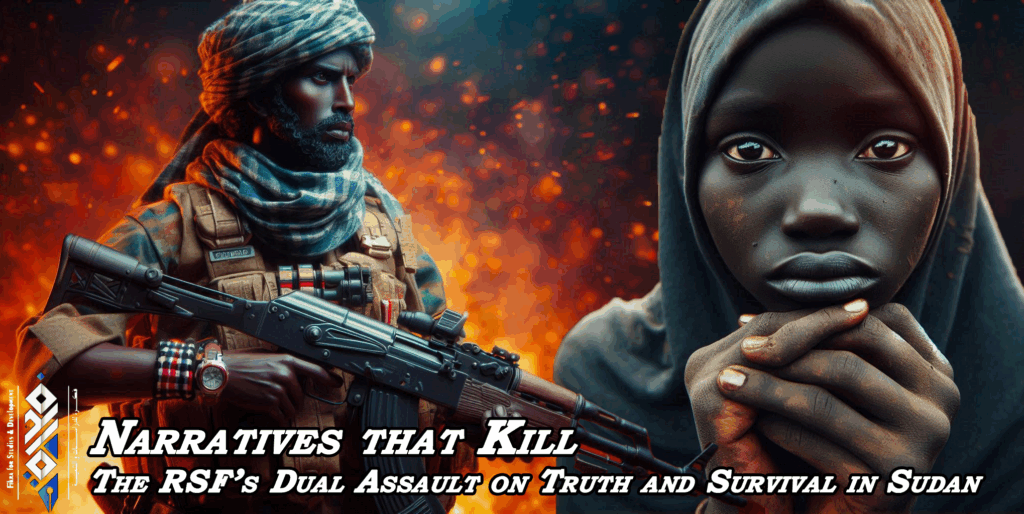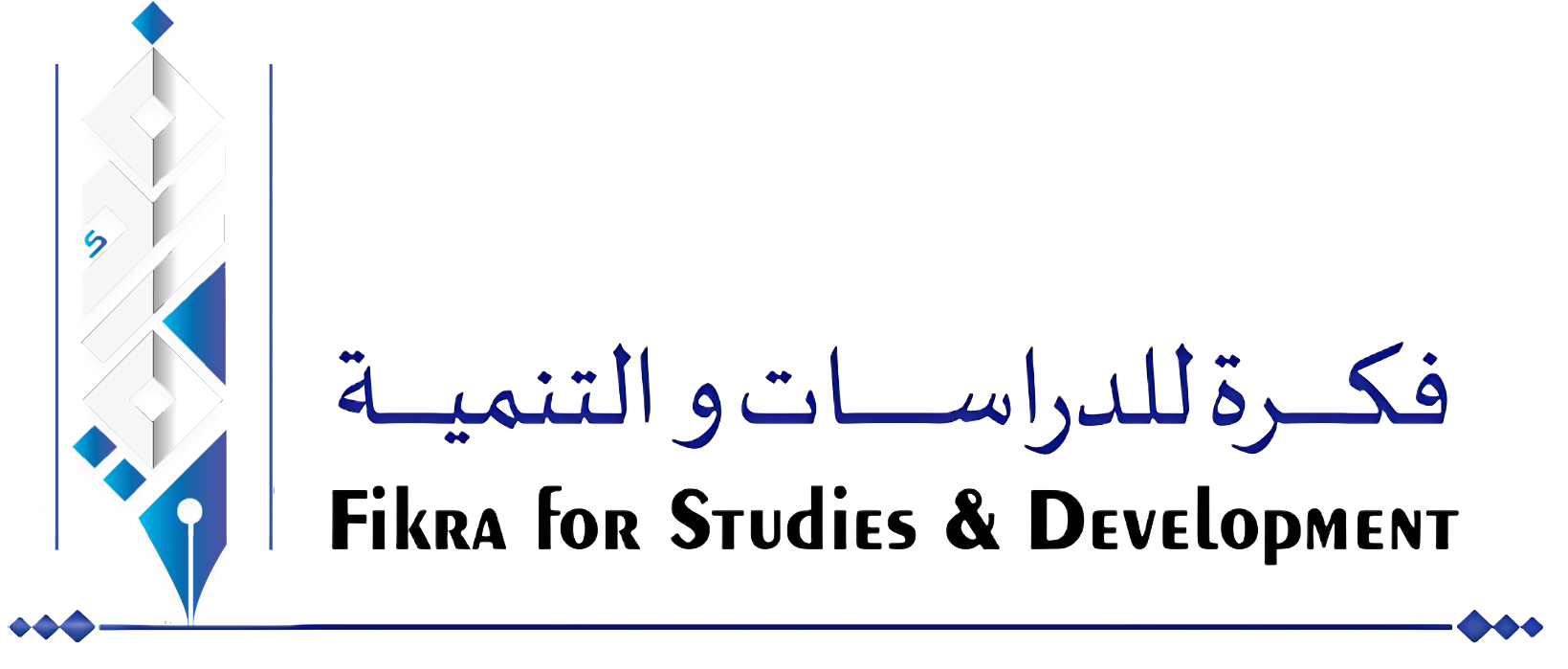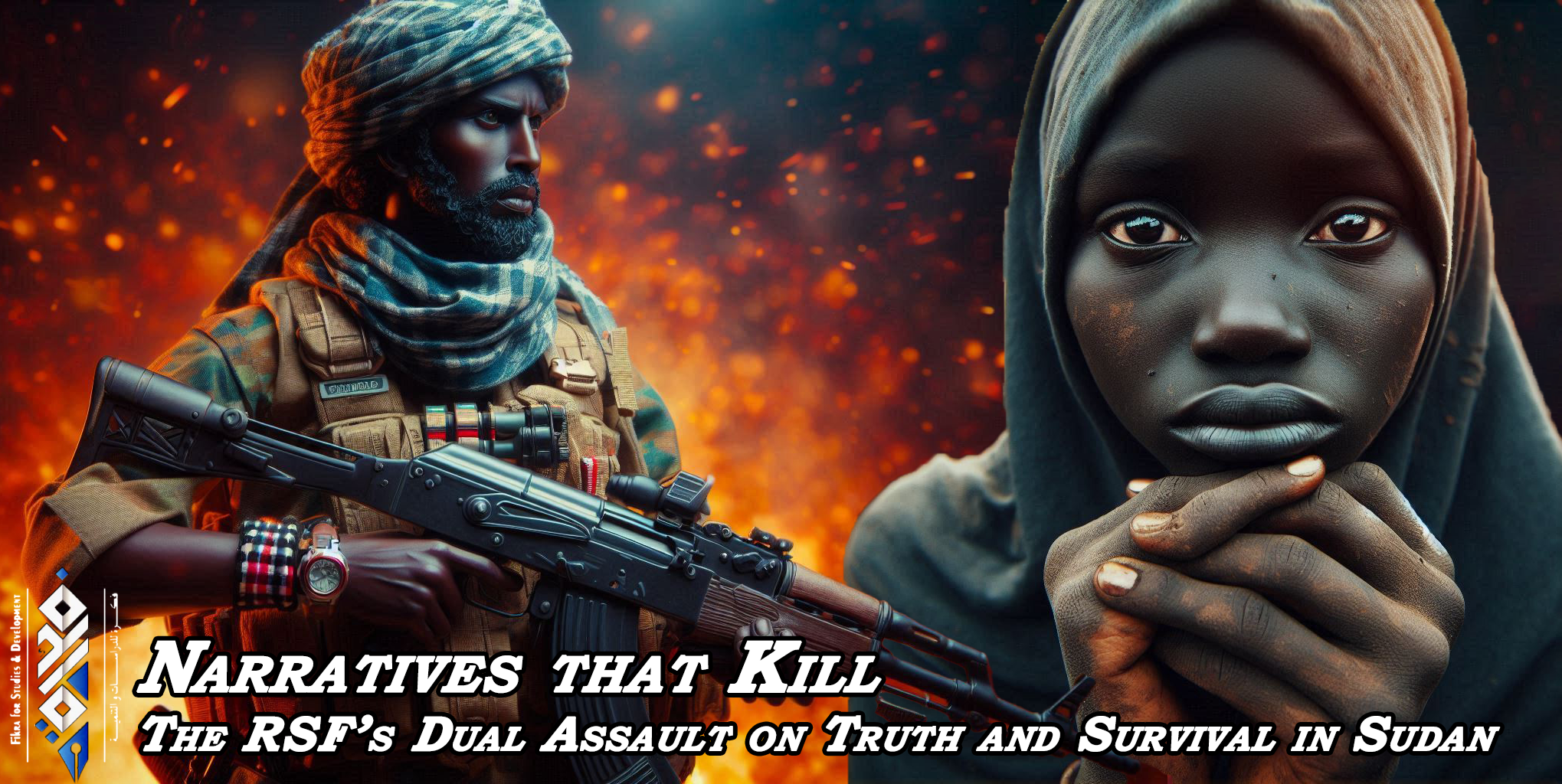Narratives that Kill; The RSF’s Dual Assault on Truth and Survival in Sudan
Narratives that Kill; The RSF’s Dual Assault on Truth and Survival in Sudan

Dallia M. Abdelmoniem
Since the outbreak of the war on April 15th in 2023, the Rapid Support Forces (RSF) militia has tried to frame and present itself as the liberators of Sudan and its people from the shackles of the Islamists and the Army. In essence they portrayed themselves as the main protagonist in their story of saving Sudan. A role they have consistently and systematically spun the wheel of misinformation and illusive narratives on, all the while applying the scorched earth tactic on all facets of life in the country. The RSF has never strayed from its claims that they are fighting this war to bring about change, maintain law and order, and protect the civilian population. Yet their actions on the ground fly in the face of their rhetoric. The RSF continued its endeavours to construct a misleading portrayal of reality, diverting attention from the actual facts on the ground. This obfuscation, in turn, hinders the development of practical solutions that can effectively assist people and resolve factual problems on the ground. This does not mean that the Sudan Armed Forces (SAF) are relieved of their heinous negligence towards the Sudanese people but in this devasting war, it is the RSF that is unleashing and perpetrating the very worst horrors of conflict.
The sexual violations, rampant looting, ethnic targeting, killing and terrorising of the populace at the hands of the militia is well documented. But what is more sinister is the calculated and pointed attacks on the livelihood and survival of Sudanese: the food chain. The Starvation Siege Strategy aiming at cutting off and blocking food supplies, agricultural and harvest production, raiding aid warehouses and convoys are just some of the ploys the RSF have utilised and applied to weaponize food in Sudan.
The lack of food security has been further aggravated by the actions undertaken by the RSF and SAF, to a certain extent, in various degrees.
And unfortunately, it is working.
A report by the Dutch think-tank, the Clingendael Institute, predicts ”…there will be estimated excess mortality of about 2.5 million people (and) 90 percent of the excess mortality will be concentrated in 10 percent of the total population, with 15 percent of the population of Darfur and Kordofan, which are likely to be worst affected, expected to die from hunger and disease by September 2024.”
Agriculture is the backbone of Sudan’s economy and for the majority of Sudanese it is their livelihood. ”The rural countryside is home to 64 percent of Sudanese who work in agriculture and pastoralism, which absorbs 80 percent of Sudan’s workforce and contributes 32.7 percent of the GDP.” A study by the UN Development Program (UNDP) and the International Food Policy Research Institute (IFPRI) found that in Sinnar and the western Kordofan states, nearly 60 percent of cultivating activities have ceased while in Khartoum state the loss reaches 68 percent. As a result, 59 percent of rural households face moderate or severe food insecurity while “…the RSF continues to prevent farmers in Gezira state—home to the largest irrigated agricultural project in the country—from harvesting their crops. Instead, they loot the produce and the machinery of the project.”
From the first days of the war, the militia attacked and looted World Food Program (WFP) warehouses in Darfur signalling a pattern of violations they have never strayed from – aid which included food and medicinal supplies meant to alleviate the dire living conditions of displaced civilians, today totalling more than 10 million. who had little when fighting broke out and now literally have nothing. The looting of the WFP warehouses was repeated in Khartoum, North Kordufan and Gezira states at the hands of the militiamen. Interestingly enough, the looted supplies and goods from ransacked warehouses, properties and homes end up being sold in the newly formed ‘Dagalo markets’, so named in homage to the RSF leader. The war has resulted in a black market boom for both SAF and the RSF, profiteering at the expense of civilians from the smuggling and sale of vital goods including food, fuel and medicine. These “smuggling networks are either run directly by army or RSF soldiers, or are run with their protection, for which the fighters are paid a commission.”
More recently, on July 14, 2024, RSF attacked traders heading from Western Fanqouqa and Umm Hajlija villages to get supplies from the weekly market in Umm Samima, located 75 kilometers north of Umm Rawaba city in North Kordufan. The militiamen opened fire indiscriminately, killing 23 people instantly, injuring tens more, and preventing resupply convoys. Similar sieges were imposed on different areas such as Tuti Island and several other villages in Gezira, Kordufan and Darfur states. Before being regained by the army, districts in Khartoum such as Burri, Elfitihab and Banat also underwent a similar siege.
To mask the deeds of its troops, the RSF leadership announced the formation of a special force tasked with addressing the criminal behaviour of its own soldiers and opportunistic gangs. It was a mere lip service that never reflected in reality, but again, it shows RSF’s attempts in portraying itself as an entity that believes in law and order, setting a narrative that is in complete contradiction to their actions on the ground.
The weaponization of hunger is a defining feature of the ongoing war in Sudan. Food is being used as a weapon of war. “Over 25 million civilians in Sudan and fleeing Sudan are being starved… Both the SAF and the RSF are using food as a weapon and starving civilians,” UN rights experts say. Meanwhile, the RSF is besieging towns, cities and villages and simultaneously blocking aid from reaching them and not allowing for safe passageways for civilians. On the other hand, the Sudan Armed Forces (SAF) in turn is not allowing access for aid to reach areas under the control of the RSF, and placing bureaucratic obstacles to halt aid and supplies leaking to the militia. Indeed, the RSF looted more than 4000 litres of fuel from UN agencies, according to an internal report, that have been passing through their controlled territory in recent months. This is in addition to the royalties that it imposes on humanitarian organizations to facilitate their operations. And the civilians are the ones paying the price.
When the war front spread southward into Al Gezira state, the RSF “took over swathes of agricultural land, laying siege to entire villages and leaving farmers unable to tend to vital crops.” January is usually harvest season “markets across the state would usually be teeming with farmers and merchants moving their crops, feeding millions. Now most of these markets are abandoned, looted or closed for fear of attack. According to officials, local activists and farmers, the RSF fighters have left nearly nothing untouched in their wake. In a statement, Gezira scheme head Omar Marzouk said, ‘the project’s cars and machinery have been looted and workers in every department are unable to reach their work’”. In December 2023, RSF soldiers looted the WFP warehouse that contained enough stock to “…feed nearly 1.5 million severely food insecure people for one month.” Early July 2024 saw another report of RSF troops seizing agricultural equipment, seeds and fertilisers from villages in Sinnar state who were accused of using “intimidation, beatings, and killings” to confiscate tractors and equipment from farmers across Al-Dinder locality. An estimated 200 tractors have been seized… (and) that the RSF looted agricultural seeds, fertilizers, and pesticides from villages and storage facilities, jeopardizing the upcoming harvest.” Moreover, “the RSF’s control of key supply routes has cut off the city’s access to food and fuel, leaving residents without basic necessities…The situation has been exacerbated by the RSF’s looting of markets and crops in surrounding villages.” The WFP has pleaded for the opening of safe corridors and that the recent uptick in fighting in Sinnar has “…cut off key supply routes for food and fuel. The route to WFP’s hub in Kosti is inaccessible…a lifeline to get assistance to hundreds of thousands of people…including communities at risk of famine.”
The Strategic Initiative for Women in the Horn of Africa (SIHA) recently published report on sexual violations in El Gezira emphasises that “the displacement and destruction caused by the entry of the RSF…not only dispossessed farmers of their land, but…also damaged critical infrastructure, such as irrigation systems, which will make restoring the community’s agricultural system extremely difficult, posing long-term dangers for agricultural labourers…With the displacement of these farmers, there is a potential for further land grabs.” The land dispossession and displacement of farmers will and is having a direct, detrimental impact on the country, especially in regard to the increasing food insecurity situation.
The Gazira irrigation scheme has also become a casualty of the RSF’s concerted attack on the food production of Sudan with its closure linked to the continuing devastation wreaked by the militia. “Launched in 1925, this vast network of canals has nurtured fields of cotton and other crops, sustaining countless livelihoods and making Al-Jazirah the breadbasket of Sudan. Despite its history of corruption and mismanagement, it has long been a symbol of hope and productivity. Now, the RSF’s campaign of devastation has turned this symbol into a casualty of war, leaving a nation rich in resources unable to feed itself.”
A sinister weapon of war pattern to emerge is that of females forced to exchange sex for food. Evidence of this pattern is shown in the report by SIHA that reflects the accounts of women and girls in Gezira whose access to food is determined by their willingness to associate with RSF soldiers and at times perform sexual acts for them. Such trends will not only worsen as food becomes less available and families are more desperate but will be more prominent and widespread as forces attack and lay siege to the agricultural heartlands in the country. Again, this is a calculated trend and further adds credence to food being weaponised.
Another sinister development is the withholding of food supplies from besieged areas to coerce men and boys to join their ranks, this was especially prevalent in El Gezira and Darfur states. According to a number of reports nearly 1000 men and children have been “forcibly recruited by the RSF…while 600, including boys under 18, joined in many cases driven by hunger… a range of coercive methods (were) employed by the RSF to compel individuals to join their ranks, including intimidation, torture, summary execution and the withholding of food and medical aid.”
It is imperative that the RSF be treated and dealt with as the entity it is – a paramilitary militia that is engaged in continuous violations stretching from conflict based sexual violations and ethnic killings to utilising starvation and destruction of food supplies to forcibly subjugate the population to acquiesce to their rule. Entertaining RSF illusive narratives about the war, would not help finding a solution to end the unbearable suffering endured by Sudanese. If the people of Sudan are not a priority for the warring generals and their armies, it is the moral responsibility of the international community that they are.
Dallia Mohamed Abdelmoniem
Head of Communication at Fikra for Studies and Development
Is an experienced journalist, media and advocacy expert who has worked as an analyst and commentator on Sudan for a number of years. Her work has appeared in AlJazeera English, African Arguments, New Lines Magazine, Medium, Daily Nation and various other platforms. Her interests are on the social and political dynamics that dominate the country’s political outlook.
She can be found on Twitter @dalliasd
And by email on dalliaa.mohamed@gmail.com


